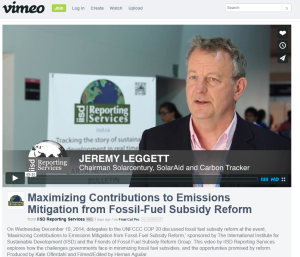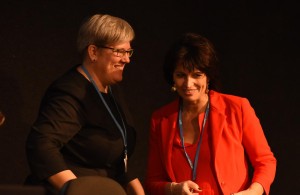Timely seminars and high level events help promote reform. Events are ordered chronologically and include an impressive number of influential speakers from around the world.
The Heroes of Climate Change are Leaders Driving National Policy Reforms

Despite slow but solid progress at the climate change negotiations in Lima, the Conference of Parties this year nonetheless saw promising discussions around national efforts to tackle climate change on-the-ground. This includes increasing calls in the last month to realize opportunities stemming from the removal of US$ 550 billion of subsidies to fossil fuels. 2014 has witnessed reforms to fossil-fuel subsidies in around 30 countries including India, Indonesia, and Egypt. Savings from reforms in Indonesia have enabled the country to develop better targeted social welfare systems, while Morocco has reformed subsidies and invested in renewable targets.
 Calls have also been made both inside and outside the UNFCCC in Lima, Peru. In France, President Hollande announced that on producer subsidies, “France wants to lead by example. We will suppress all export credits within the support we provide to developing countries whenever coal is used. And we will also ensure at European level that we can eventually phase out fossil fuel subsidies. This is what we need to do.” In Lima, discussions linked to fossil-fuel subsidy reform hinged on emissions mitigation contributions through getting energy prices right, potential public financing for low-carbon energy and transport systems from subsidy savings, improved fuel efficiency in the transport sector, as well as levelling the playing field for renewables in the electricity sector.
Calls have also been made both inside and outside the UNFCCC in Lima, Peru. In France, President Hollande announced that on producer subsidies, “France wants to lead by example. We will suppress all export credits within the support we provide to developing countries whenever coal is used. And we will also ensure at European level that we can eventually phase out fossil fuel subsidies. This is what we need to do.” In Lima, discussions linked to fossil-fuel subsidy reform hinged on emissions mitigation contributions through getting energy prices right, potential public financing for low-carbon energy and transport systems from subsidy savings, improved fuel efficiency in the transport sector, as well as levelling the playing field for renewables in the electricity sector.
Environment and Energy Ministers such as Federal Councillor Doris Leuthard, Department of the Environment, Transport, Energy and Communications, Switzerland, raised the issue directly within the Plenary. Parties such as Norway and Switzerland also raised the need for a Technical Expert Meetingfocused on mitigation, including fossil-fuel subsidy reform. This would enable countries to understand better the interaction between economic fiscal policy around subsidies and taxation of carbon within a package of mitigation measures alongside the UNFCCC process.
 The IISD’s Global Subsidies Initiative and the Friends of Fossil Fuel Subsidy Reform (a group of countries organized to raise the issue of fossil-fuel subsides and their reform) raised the issue within the CoP through a high-level side event. This included Federal Councillor Leuthard of Switzerland, who urged solutions for phasing out fossil-fuel subsidies, finding sustainable alternatives and creating a better market price for energy. She called on leaders to create a world that encourages economic growth without an annual increase on energy consumption (IISD Reporting Services, 10th December 2014). Rachel Kyte, Vice President and Special Envoy, Climate Change Group, World Bank Group, noted that “we are going to have to get rid of the things we are doing which are frankly inefficient from the perspective of protecting the poor, from the perspective of growing and from the perspective of decarbonization, and the poster child for all of these is fossil-fuel subsidy reform.” Furthermore, the “heroes that we need in the next year … [are] elected leaders who can sit down in front of an electorate and explain why one policy is not working well enough … why another one might do better, what [leaders] will do to protect them in the process of moving from one policy framework to another – those people are the heroes.” Leonardo Martinez-Diaz, Deputy Assistant Secretary for Environment and Energy, U.S. Treasury Department, described fossil-fuel subsides as “unfair and regressive”… noting the importance of transparency through peer review in the subsidies reform arena, highlighting the US and China’s announcement to participate in a G-20 peer review process addressing fossil-fuel subsidies (IISD Reporting Services, 10th December 2014). Speakers also included: Jeremy Leggett, Founder and Chairman, Solarcentury; Simon Buckle, Environment Directorate, OECD; James Close, Director, Climate Change Group, World Bank; Laura Merrill, Global Subsidies Initiative; and was moderated by Jo Tyndall, Climate Change Ambassador, New Zealand. Further reporting from the side event is available here.
The IISD’s Global Subsidies Initiative and the Friends of Fossil Fuel Subsidy Reform (a group of countries organized to raise the issue of fossil-fuel subsides and their reform) raised the issue within the CoP through a high-level side event. This included Federal Councillor Leuthard of Switzerland, who urged solutions for phasing out fossil-fuel subsidies, finding sustainable alternatives and creating a better market price for energy. She called on leaders to create a world that encourages economic growth without an annual increase on energy consumption (IISD Reporting Services, 10th December 2014). Rachel Kyte, Vice President and Special Envoy, Climate Change Group, World Bank Group, noted that “we are going to have to get rid of the things we are doing which are frankly inefficient from the perspective of protecting the poor, from the perspective of growing and from the perspective of decarbonization, and the poster child for all of these is fossil-fuel subsidy reform.” Furthermore, the “heroes that we need in the next year … [are] elected leaders who can sit down in front of an electorate and explain why one policy is not working well enough … why another one might do better, what [leaders] will do to protect them in the process of moving from one policy framework to another – those people are the heroes.” Leonardo Martinez-Diaz, Deputy Assistant Secretary for Environment and Energy, U.S. Treasury Department, described fossil-fuel subsides as “unfair and regressive”… noting the importance of transparency through peer review in the subsidies reform arena, highlighting the US and China’s announcement to participate in a G-20 peer review process addressing fossil-fuel subsidies (IISD Reporting Services, 10th December 2014). Speakers also included: Jeremy Leggett, Founder and Chairman, Solarcentury; Simon Buckle, Environment Directorate, OECD; James Close, Director, Climate Change Group, World Bank; Laura Merrill, Global Subsidies Initiative; and was moderated by Jo Tyndall, Climate Change Ambassador, New Zealand. Further reporting from the side event is available here.
In other events Felipe Calderón, former President of Mexico and Chair of The Global Commission on the Economy and Climate, called for reform of subsidies to fossil fuels and Paul Polman, CEO of Unilever, put it bluntly with “get rid of those subsidies”. The GSI’s Laura Merrill also spoke on reforming subsides to fossil fuels during the IEA Energy Day and SloCaT’s Transport Day.
 Countries aiming for an agreement in Paris in 2015 are looking for ways to increase the ambition of national mitigation efforts and to bring this to table potentially as part of their Nationally Intended Contributions. Economic fiscal instruments, including removal of subsidies to fossil fuels, could support a package of actions including targets for renewables, energy and fuel efficiency measures. Despite dramatic reductions in the cost of solar power, subsidies to fossil fuels act as a barrier to renewable energy in the electricity sector, a report launched by the Global Subsidies Initiative at the event explains. See the press release here.
Countries aiming for an agreement in Paris in 2015 are looking for ways to increase the ambition of national mitigation efforts and to bring this to table potentially as part of their Nationally Intended Contributions. Economic fiscal instruments, including removal of subsidies to fossil fuels, could support a package of actions including targets for renewables, energy and fuel efficiency measures. Despite dramatic reductions in the cost of solar power, subsidies to fossil fuels act as a barrier to renewable energy in the electricity sector, a report launched by the Global Subsidies Initiative at the event explains. See the press release here.
G20 and APEC countries committed in 2009 to phase out inefficient fossil-fuel subsidies. Whilst climate change negotiations may stumble, on fossil-fuel subsidy reform countries are actually starting to walk the talk. Subsidies decreased in 2013 from 2012, mostly due to lower oil prices, but also due to actions by governments. Lower oil prices make it easier to gradually dismantle fuel subsidies to consumers, in that impacts on the economy will likely be less pronounced than attempting to raise fuel prices to international levels within periods of a high oil price.
There are many good reasons to reform subsidies to fossil fuels in 2015—and climate change is one of them.